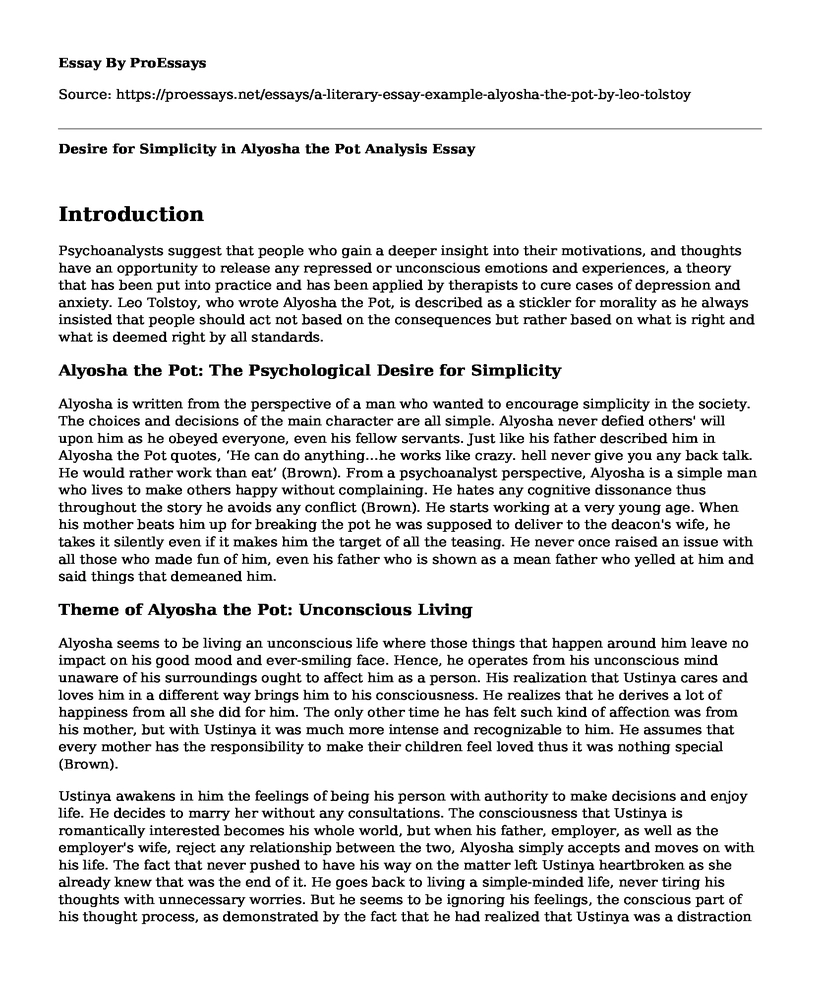Introduction
Psychoanalysts suggest that people who gain a deeper insight into their motivations, and thoughts have an opportunity to release any repressed or unconscious emotions and experiences, a theory that has been put into practice and has been applied by therapists to cure cases of depression and anxiety. Leo Tolstoy, who wrote Alyosha the Pot, is described as a stickler for morality as he always insisted that people should act not based on the consequences but rather based on what is right and what is deemed right by all standards.
Alyosha the Pot: The Psychological Desire for Simplicity
Alyosha is written from the perspective of a man who wanted to encourage simplicity in the society. The choices and decisions of the main character are all simple. Alyosha never defied others' will upon him as he obeyed everyone, even his fellow servants. Just like his father described him in Alyosha the Pot quotes, ‘He can do anything…he works like crazy. hell never give you any back talk. He would rather work than eat’ (Brown). From a psychoanalyst perspective, Alyosha is a simple man who lives to make others happy without complaining. He hates any cognitive dissonance thus throughout the story he avoids any conflict (Brown). He starts working at a very young age. When his mother beats him up for breaking the pot he was supposed to deliver to the deacon's wife, he takes it silently even if it makes him the target of all the teasing. He never once raised an issue with all those who made fun of him, even his father who is shown as a mean father who yelled at him and said things that demeaned him.
Theme of Alyosha the Pot: Unconscious Living
Alyosha seems to be living an unconscious life where those things that happen around him leave no impact on his good mood and ever-smiling face. Hence, he operates from his unconscious mind unaware of his surroundings ought to affect him as a person. His realization that Ustinya cares and loves him in a different way brings him to his consciousness. He realizes that he derives a lot of happiness from all she did for him. The only other time he has felt such kind of affection was from his mother, but with Ustinya it was much more intense and recognizable to him. He assumes that every mother has the responsibility to make their children feel loved thus it was nothing special (Brown).
Ustinya awakens in him the feelings of being his person with authority to make decisions and enjoy life. He decides to marry her without any consultations. The consciousness that Ustinya is romantically interested becomes his whole world, but when his father, employer, as well as the employer's wife, reject any relationship between the two, Alyosha simply accepts and moves on with his life. The fact that never pushed to have his way on the matter left Ustinya heartbroken as she already knew that was the end of it. He goes back to living a simple-minded life, never tiring his thoughts with unnecessary worries. But he seems to be ignoring his feelings, the conscious part of his thought process, as demonstrated by the fact that he had realized that Ustinya was a distraction at work. It is his mind that chooses the simple way out of every situation.
Conclusion
At his death, he is conscious of something that amazes him, which finally startled him to his death. He seems to awaken and bring to consciousness something he had not realized before. But just like he had lived his life, he doesn't talk much asking for necessities only. Simplicity shown by a lack of taking care of himself was his slogan in life - he often missed dinner and were it not for the cook's pity on him he would have gone without, and he did not have any clothes to make him appear respectable.
Works Cited
Brown, Clarence. (1985). The portable twentieth-century Russian reader. New York: Penguin books.
Cite this page
Desire for Simplicity in Alyosha the Pot Analysis. (2021, Apr 16). Retrieved from https://proessays.net/essays/a-literary-essay-example-alyosha-the-pot-by-leo-tolstoy
If you are the original author of this essay and no longer wish to have it published on the ProEssays website, please click below to request its removal:
- The Pit and the Pendulum by Edgar Poe - Analysis Essay Sample
- Literary Analysis Essay on Lady Lazarus and Daddy by Sylvia Plath
- Commentary of I Wandered Lonely as a Cloud Essay
- Sugar by Bernice McFadden Essay Example
- Medea's Otherness and Its Role in Shaping The Play Essay Example
- Rachel Carson: From Nature Explorer to Renowned Environmental Author - Essay Sample
- To Kill A Mockingbird - Movie Analysis Essay







